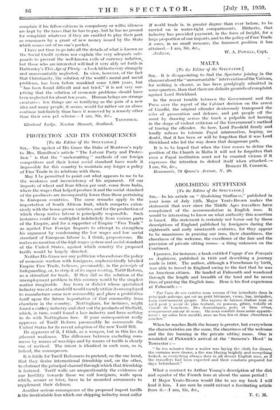[To the Editor of the SPEcrAvon.] Sun,—The upshot of His
Grace the Duke of Montrose's reply to Mrs. Hamilton's article " The Labour Party and Protec- tion " is that the " undercutting " methods of our foreign competitors and their lower social standard have made it impossible for this country to maintain any longer a policy of Free Trade in its relations with them.
May I be permitted to point out what appears to me to be the weakness and inconsistency of his argument. Of our imports of wheat and flour fifteen per cent. come from India, where the wages that helped produce it and the social standard of the producers are incomparably lower than those pertaining to European countries. The same remarks apply to the importation of South African fruit, which competes exten- sively with the home-grown varieties, and for the production of which cheap native labour is principally responsible. Such instances could be multiplied indefinitely from various parts of the Empire, and for a supporter of Empire "Free Trade" as against Free Foreign Imports to attempt to strengthen his argument by condemning the low wages and low social standard of European labour is, I think, preposterous. He makes no mention of the high wages system and social standard of time United States, against which country the proposed tariffs would be largely directed.
Neither His Grace nor any politician who endorses the policy of economic warfare with foreigners, euphemistically labelled Empire Free Trade, believes, presumably, in the principle of Safeguarding, or, to strip it of its sugar coating, Tariff Reform, as a stimulant for trade. If they did so the solution of the unemployment problem in this country would be the simplest matter imaginable. Any town or district whose specialized industry was at a standstill would merely utilize its unemployed to manufacture some new commodity and place a prohibitive tariff upon the future importation of that commodity from elsewhere in the country. Nottingham, for instance, might found a cutlery industry and shut out the products of Sheffield, which, in turn, could found a lace industry and have nothing to do with Nottingham lace. If your correspondent really approves of Tariff Reform presumably he commends the United States for its recent adoption of the new Tariff 13111.
He approves of it, I think, as a weapon, but in this lies its inherent weakness. The difference between excluding com- merce by means of warships and by means of tariffs is clearly one of method. The intent is identical in each ease, as is, indeed, the consequence.
It is futile for Tariff Reformers to pretend, on the one hand, that they desire international friendship and, on the other, to obstruct the principal channel through which that friendship is fostered. Tariff walls are unquestionably the evidences of our hostility towards those we call foreigners, walls upon which, sooner or later, have to be mounted armaments to supplement their defence.
Another serious consequence of the proposed import tariffs is the incalculable loss which our shipping industry must suffer if world trade is, in greater degree than ever before, to be carried on in water-tight compartments. Hitherto, that industry has provided payment, in the form of freight, for a large proportion of our imports, and to the policy of Free Trade it owes, in no small measure, the foremost position it has attained.—I am, Sir, &c.,
















































 Previous page
Previous page